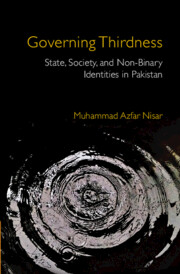Book contents
8 - Governing Thirdness at Work
Published online by Cambridge University Press: 10 December 2021
Summary
The question of earning money ultimately confronts everyone in society and the khawaja sira are no exception. In this chapter, I focus on the sources of income and economic inclusion of the khawaja sira, most of whom live in deep poverty. In line with my focus on governance and citizenship of the khawaja sira, I primarily focus on the experience of khawaja sira in formal workplaces in this chapter. Another reason for this analytical choice is that, with the exception of begging, the informal ways of making money are increasingly drying up in most urban centres of Pakistan. As I discuss in more detail in the next chapter, there is a set of bureaucratic apparatuses that limit the khawaja sira's ability to make money even through begging. Moreover, formal employment is often presented as the most effective way to ensure economic inclusion of the khawaja sira. However, as I discuss in this chapter, given the various ways in which they are governed, disciplined, and ostracized in the workplace, this is not a straightforward ‘solution’ for the khawaja sira and would require a lot of associated work on creating inclusive workspaces. However, for the sake of comprehensiveness, I first provide a brief overview of their traditional informal sources of income before analysing their experiences of formal employment.
Traditional Source of Income
Traditionally, the most legitimate source of income for the khawaja sira was collection of badhai: money given to the khawaja sira at festivities such as marriage or birth of a child, generally accompanied by a dancing and singing performance by them. Badhai, a seemingly innocuous ceremonial activity, has at its roots in multiple intersecting historical discourses. The khawaja sira are given badhai at marriage ceremonies primarily because of traditional notions of their ability to confer fertility upon newlywed couples (Nanda 1990; Reddy 2005). However, another reason to remain in the good books of the khawaja sira, especially at ceremonial events such as marriage and birth of a child, was the fear of their curses, which historically have been considered very potent (Nanda 1990). According to many members of the community, yet another important reason the khawaja sira were historically socially sanctioned to visit homes where a newborn was present was to facilitate the adoption of children born with ambiguous genitals by the khawaja sira community.
- Type
- Chapter
- Information
- Governing ThirdnessState, Society, and Non-Binary Identities in Pakistan, pp. 134 - 152Publisher: Cambridge University PressPrint publication year: 2022

